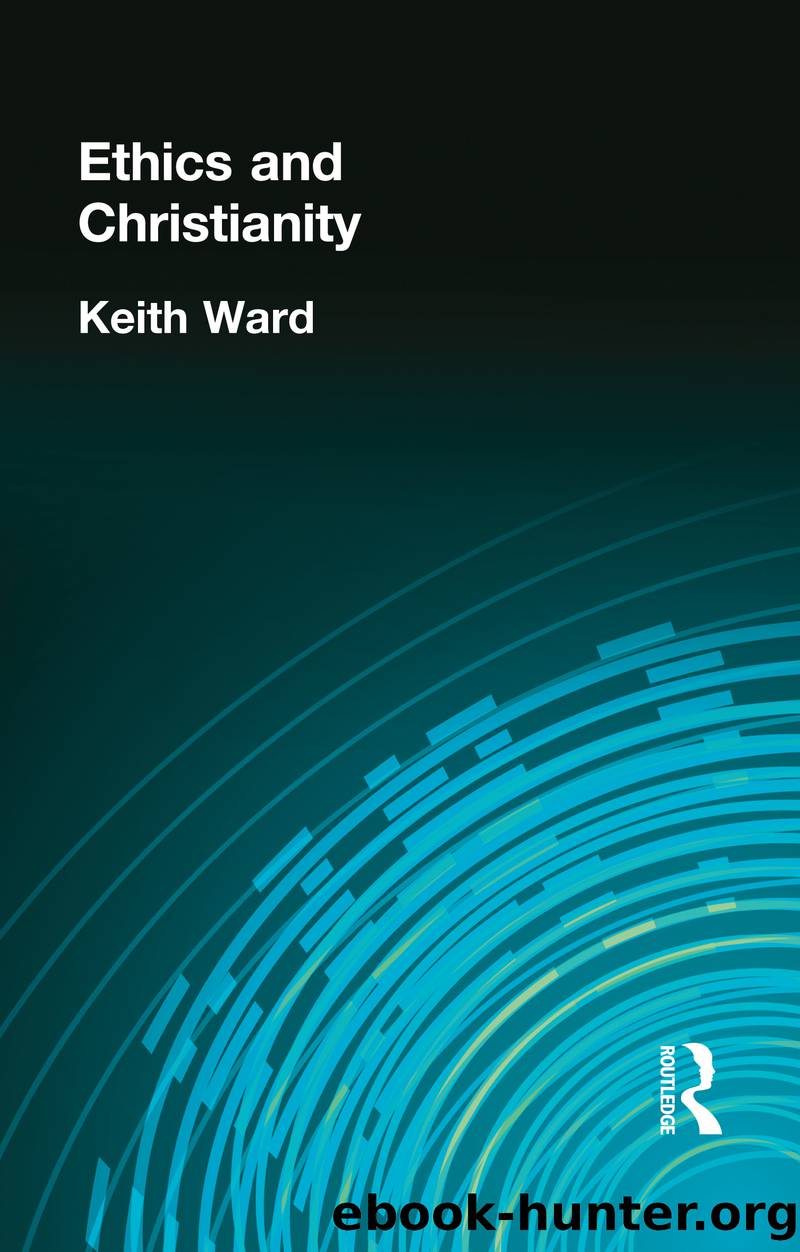Ethics and Christianity by Ward Keith;

Author:Ward, Keith; [Ward, Keith]
Language: eng
Format: epub
Publisher: Taylor & Francis Group
Published: 2022-06-20T00:00:00+00:00
Here, then, are two elements of the human situation which are quite universal in scopeâthey apply to all men everywhereâthe vision of a total demand which may be further understood as creative ground and demanded goal of human existence; and the radical inability of men to perceive or meet adequately the demands made upon them. The Christian believes, as will be more fully shown, that a third universal element of the human condition is expressed in the Divine promise that, in the end, the moral demand will be fully met in the world and human rejection of it will be overcome. The belief in this promise is grounded chiefly on the Christian experience of regeneration through the objective power of Christ. The Christian âgood newsâ is that man's rejection shall be transcended, but by the coming of the Spirit, not by his own effortsâthat is, by grace.9 Faith is founded firmly on the work of grace in men, not just on an ethical commitment: it is the hope for completion of a work already begun, and based on the promise of Christ.
But in saying this it should be noted that one is not here making an abrupt transition from evaluative statements to factual statements. The very readiness to assent to these factual statements is conditional upon the sort of evaluation of human experience which sets them in a context of intelligibility. That is to say, the preparedness to say âyesâ to the work of the Spirit in oneself, and the willingness to interpret this work as the work of the Spirit, logically presupposes an evaluative interpretation of experience as mediating absolute and objective moral demands and of one's own endeavours as radically ineffective in meeting those demands. These are evaluative decisions; or, more properly, they are reflective explorations of the metaphysical foundations of the morality we accept. Christian faith arises out of moral experience (if it does) as a certain way of understanding that experience gradually becomes clearer, and as these tentative interpretations tend to be corroborated (if they do) by experiences which seem to be adequately describable by the use of the interpretative concepts one has already elaborated. Thus fact and evaluation proceed indivisibly; and if, by harsh analyses, the purely factual elements (for example, âthere is a Holy Spiritâ) are strained out from the purely evaluative elements (for example, âI ought to rely on the Spiritâ), the inner truth of the situation is at once destroyed. For the situation is that how one interprets certain experiences as facts, and thus what one counts as facts in this realm, depends essentially upon the set of concepts which express one's evaluative stance in the world. Thus one might ask if belief in the existence of the moral ideal is a matter of fact or of evaluation; since it speaks of âexistenceâ it must be a matter of fact; and yet this is not a fact which can be established by any experimental methods of verification. Why does one say that
Download
This site does not store any files on its server. We only index and link to content provided by other sites. Please contact the content providers to delete copyright contents if any and email us, we'll remove relevant links or contents immediately.
Signature in the Cell: DNA and the Evidence for Intelligent Design by Stephen C. Meyer(2879)
Real Sex by Lauren F. Winner(2867)
The Holy Spirit by Billy Graham(2777)
The Secret Power of Speaking God's Word by Joyce Meyer(2754)
The Gnostic Gospels by Pagels Elaine(2399)
Jesus by Paul Johnson(2229)
Devil, The by Almond Philip C(2205)
23:27 by H. L. Roberts(2144)
The Nativity by Geza Vermes(2115)
Chosen by God by R. C. Sproul(2055)
All Things New by John Eldredge(2052)
Angels of God: The Bible, the Church and the Heavenly Hosts by Mike Aquilina(1870)
Angels by Billy Graham(1844)
The Return of the Gods by Erich von Daniken(1841)
Knowing God by J.I. Packer(1724)
Jesus of Nazareth by Joseph Ratzinger(1708)
Evidence of the Afterlife by Jeffrey Long(1705)
The Gnostic Gospel of St. Thomas by Tau Malachi(1680)
How To Be Born Again by Billy Graham(1670)
